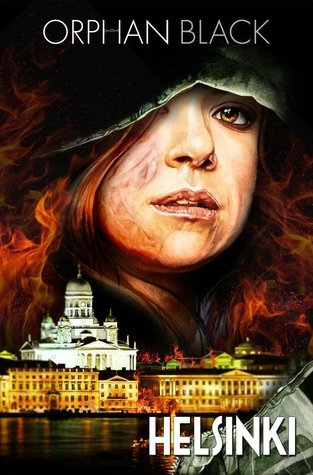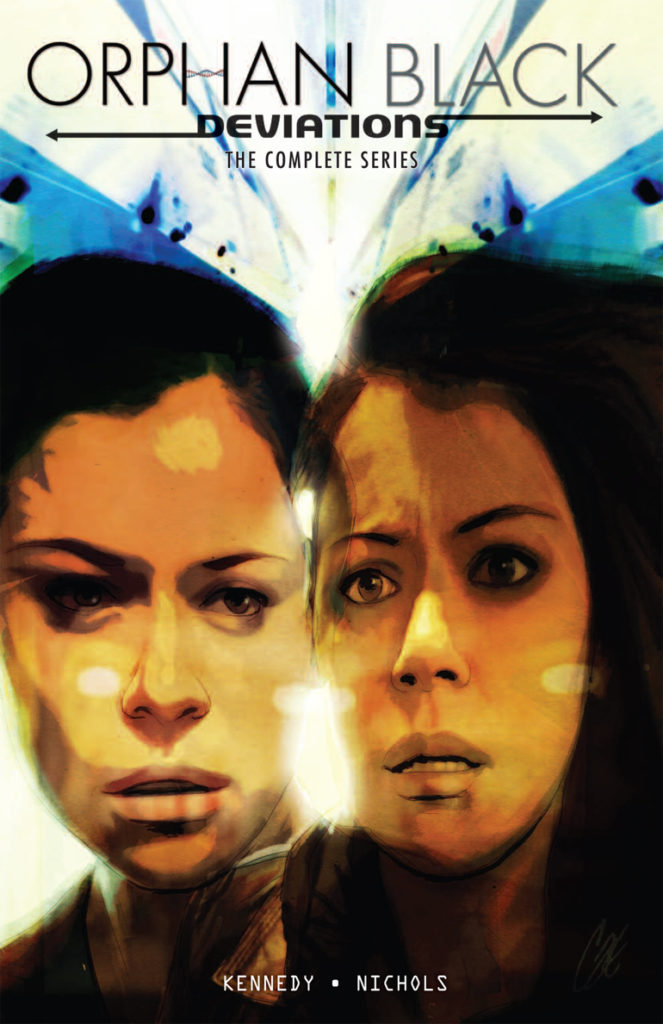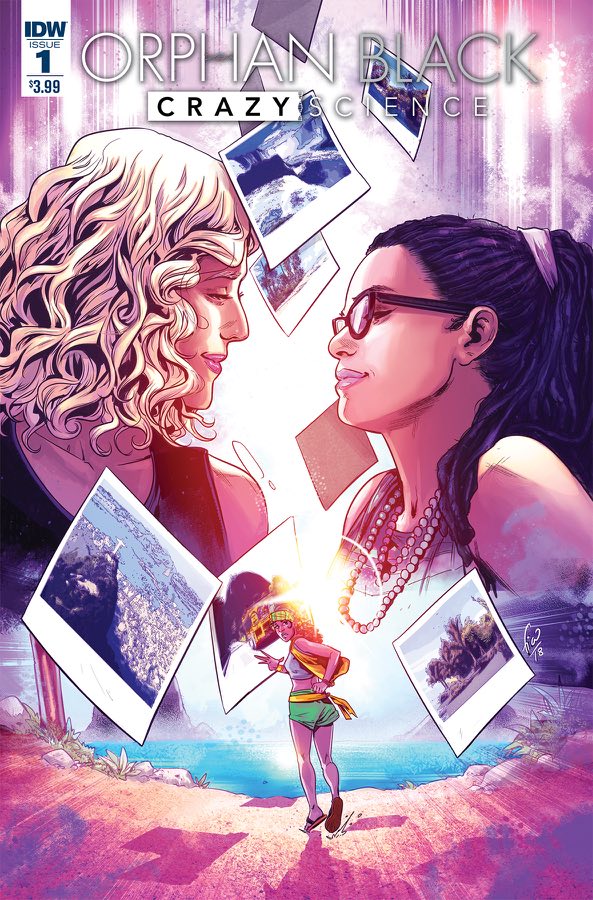Podcast: Play in new window | Download | Embed
Subscribe: Apple Podcasts | Spotify | Amazon Music | Email | TuneIn | RSS | More
An hour-long conversation with Heli Kennedy, writer for several projects continuing the saga of the hit TV series Orphan Black, including Orphan Black: The Next Chapter, a book series from Serial Box; she has also written for Ubisoft computer games, and is a screenwriter who has written, produced, and acted in short films that have screened around the world.
Twitter
@HeliKennedy
Instagram
@HeliKennedy
The Introduction
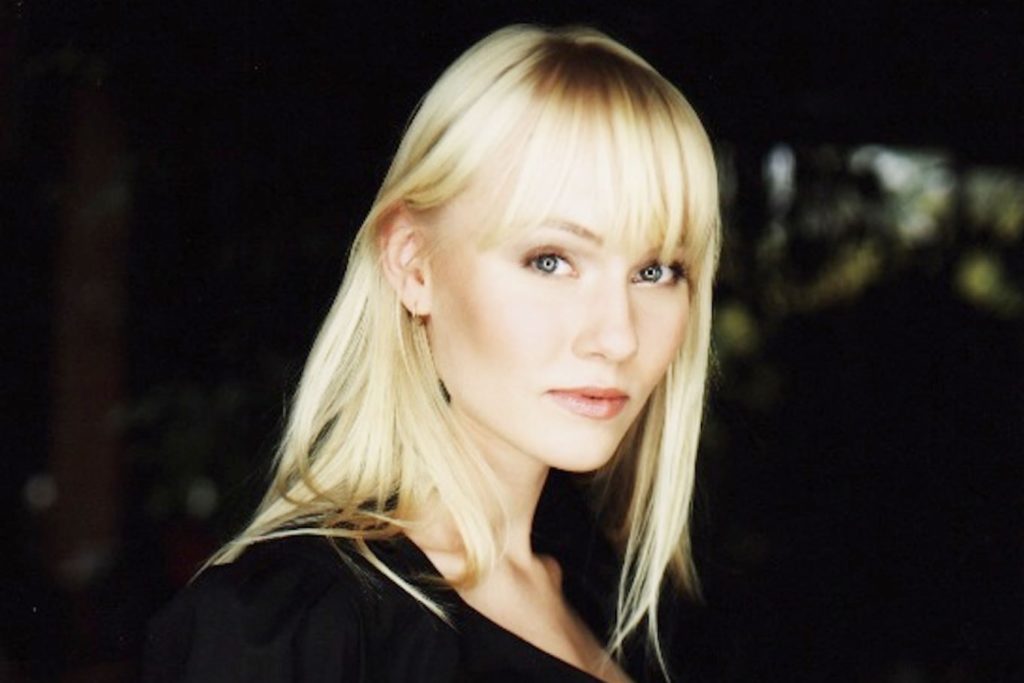
Heli Kennedy has authored multiple comic book series for the critically acclaimed TV show Orphan Black, including Deviations, an alternate-universe plotline that reimagines the first season of the show. Also a screenwriter, she has written, produced, and acted in award-winning short films that have screened around the world. Her latest work includes consulting and writing on Orphan Black: The Next Chapter, a Serial Box book series that continues the clone saga through print and audiobooks read by the show’s star, Tatiana Maslany. She’s currently writing on an unannounced project for Ubisoft, where she also wrote for the upcoming “play as anyone” game, Watch Dogs: Legion. Leaning into her fantasy genre nerdiness, Heli is working on a novel entitled The Penny Discount.
The (Lightly Edited) Transcript
So, welcome to The Worldshapers, Heli.
Hi, thanks for having me on.
This will be interesting. Now, I always like to start off by figuring out what I have in common with whomever I’m speaking with. And oddly enough, we have an odd connection, in that we’re going to be talking about your work on Orphan Black: The Next Chapter, and you’ve also done some work on Orphan Black comics before that. But Orphan Black: The Next Chapter is being narrated by Tatiana Maslany, of course, who starred in Orphan Black. And I’ve known Tat since she was a little girl. So, there’s an odd connection for you.
Well, that’s kind of wild. You said that you had taught her and directed her?
Well, I didn’t exactly teach her. But she was in…there’s a young people’s theatre group here called Do It with Class Young People’s Theatre that she was a member of. And when she was eleven, I think? It was ninety…oh, I shouldn’t say that. Probably give away her age. Anyway, it was 1997, because it’s the year I got married and I had directed a production of Snow White and the Seven Dwarves, in which all the dwarves were played by little girls with beards. And Tat was one of them.
Amazing. Do you remember which dwarf she was?
They weren’t the usual Disney dwarves. It was…they had all different names, so I don’t remember that at all. I cast my newlywed wife as the evil queen, which I thought was a rather brave choice on my part.
That’s quite brave, actually. Right.
And, of course, my joke recently has been, if I’d known then what I know now, that Tatiana could have played all seven dwarves.
Yeah, you’re right. You could have had a really unique play on your hands.
So, I’m gonna start by taking you back into the mists of time. And…I always say that…and see how you first got interested in telling stories. I saw in an interview with you that when you were about seven years old, you started creating your own stories based on Tolkien. So, is that kind of when you got going and how did that all come about? And where were you growing up, for that matter?
I grew up in downtown Toronto, in Canada. And yeah, I started writing when I was six. It started with Nancy Drew. I was really into kind of the creepy, strange story…well, that’s what I thought…as the storylines in Nancy Drew when I was six years old. And I was also really into Star Trek. And I thought it would be really neat to combine the two things. Yeah. It was a little bit of a genre mash-up. And so I started rewriting Nancy Drew books with a kind of sci-fi element. So I would have her, you know, finding a secret passageway and a hidden door that would lead her to another dimension where there would be strange aliens or giant eyeballs. It was pretty surrealistic, I have to say. But, yeah, I started writing those, and it really came from this sense when I was at school that, you know, writing was something that was, you know, an impossible thing to do. You know, I would see kids older than I was writing pages, like foolscap, full of, like, story, just pages and pages of story, and I was really impressed by it and daunted and thought I couldn’t do it, so I kind of threw myself at it to try and do it. And I’ve been writing ever since.
When I was seven, I was writing picture books for my class and reading them, and I kind of spent the whole year writing books for my classmates. And I had what I thought was a small publishing company at the time. And then I got into Tolkien and started writing alternate storylines set in Middle Earth, set in Tolkien’s fiction, because I really, really enjoyed it and connected with some of the themes, and I wanted more female characters. So, my best friend and I created storylines with more female characters. And then it kind of…from there, it morphed into…I was really into collecting old movie memorabilia as I grew up, too, like things from the ‘30s and ‘40s and ‘50s, and it got me into filmmaking, and I started to make films with my friend. And she and I kept working on storylines and brought it into…we started to develop filmmaking skills, I guess? And then I was getting grant money to make films, I think, like, right after high school, and I just kept going.
You mentioned Tolkien and Nancy Drew. Were there other books that were kind of important to you that got you hooked on telling stories?
Yes…
Most of us start out as readers, so…
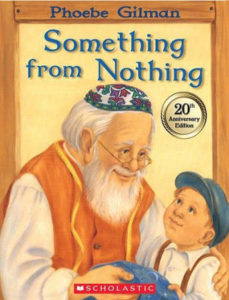
Yeah, exactly. There was a book called Something from Nothing, it’s a picture book, and I think my second-grade teacher read it to the class and it really impacted me, ’cause it’s a story about…I think it’s about a little boy and his blanket, and in the end he ends up making something out of the blanket, when…I think it wears down to a tiny skirt—now I could be completely misremembering this, but—it wears down into a tiny square, because it becomes ratty, and then he makes something new out of it and he makes something seemingly from nothing. And it’s a story about him and his grandfather, I think. And I think the message of, you know, creating something out of nothing and having a profound impact by creating something out of nothing, that it was positive and could connect with someone else, that really hit me. And that book influenced me a lot because I think writing is largely about creating…seemingly something out of nothing, I mean, it’s not nothing, you use your experiences and people you meet and ideas and what’s going on in the world around you to form stories…but it’s something that you can just create, no matter what you have, if you don’t have anything else. Like, you know, filmmaking is an expensive medium, lot of collaboration, time and money. Same with videogames, which is what I’m working on right now. But writing alone was something that felt fulfilling because I could really build off of things I could pull from the ether and then connect with people over a story I wrote. So that was really impactful for me.
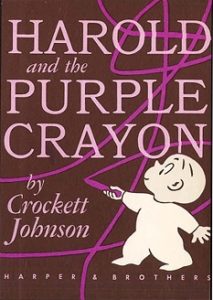
It’s interesting to mention a book like that because I don’t remember a lot of the books I read as a small reader, but one that always stuck with me was Harold and the Purple Crayon. I think it’s Harold.
Yeah, I remember that.
Yeah, and he would draw things, and again, creating things out of nothing with his purple crayon. And I hadn’t thought about that for a while, but when you were mentioning this other book that sort of had that same idea, that was one that captured my interest early on, and maybe that was a foreshadowing of me becoming a writer later in life.
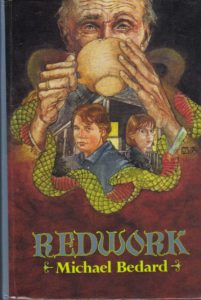
Yeah. I think that the books that we read when we’re really young, have a lot…a huge impact on us. It took me years to really remember that book in particular and make that connection. It kind of just came back one day in the last five, six years. And I started to really think about it and I realized I’d taken more from that story than I had, you know, really given it credit for until later in life. And there was another Canadian author, I think he’s in Toronto, Michael Bedard and…I don’t know, maybe I didn’t pronounce the last name properly…but he wrote a book called Redwork, and it was set in the neighborhood that I grew up in, or so it seemed, because it held many of the same elements, like the same park and a movie theater that used to exist on the main street in my neighborhood. And it was about alchemy, so it had this kind of, you know, this otherworldly fantasy aspect to it, but it also felt really grounded because I could relate to it because it was set in my city. And yeah, that heavily influenced me, too. It had a lot of mystery. It was dark. Yeah. Yeah, that book stuck with me. A lot of things that I read along with Tolkien, with The Hobbit in particular, the stuff that I think informed me the most happened probably in the first ten years, if I go back to really think about, you know, well, what do I like to write about, and what are the topics I gravitate towards or the genres? It was really those first ten years, I think.
You mentioned that you became more focused on filmmaking. I’m curious, what kind of equipment were you using in high school? I don’t know, let’s see…you’re younger than I am. So, when I think back to when I was in high school, there was absolutely no possibility that any of us were gonna be doing that, unless it was with, you know, a Super 8 film camera. But what were you doing, using, to make short films in that time?
Well, when I first started, I think I was eleven or something like that, and we had a kind of a Sony, just a camcorder or a VHS camcorder, and we would record and then kind of edit with the VCR to VCR kind of, style of editing. So it wasn’t, you know, really high-quality in the beginning and it was an onboard mike, and we were always kind of disappointed with what we’ve created because we had really high standards for what we wanted to make and we just couldn’t meet them. But later in high school, I had a friend that I was making films with, and he had an XL1. So that was like a camera, that was a mini-DV camera at the time, it was made by Canon, and we could connect a boom mike to it so we could have a nicer microphone, and it shot…it was, you know, for indie filmmaking, it was not…it wasn’t…it was like a prosumer camera, I would say. It wasn’t like, pro, it wasn’t like…you weren’t going to get film quality out of it, but you could do, you could shoot pretty well with that. And so, that’s what we started to use later on, cause my friend had one, and he had saved up in high school, and he shot a feature film in high school with it and it traveled the festival circuit.
So, yeah, we were using something that was pretty decent and then editing on Final Cut Pro on a laptop because by that time, though, everything was still…there was an analog element…you could convert to digital files by plugging the camera into your laptop and importing footage. So there…we had the ability to do way more with stuff at home than ever before. It’s…now, kids can just shoot on iPhones and edit, like, on the phone, and uploaded it to YouTube, and they have, you know, videos and videos and channels that are filled with content. Back then, it took a little more time, but it was kind of the beginning of that era where you could just make videos at home and readily like, you know, put them on a computer and send them out over the Internet in a compressed file or whatnot.
And you were writing the scripts for these short films that you’re making at the time?
Yeah, some of them I did write and some of them I kind of story-edited and produced, and I acted in some of them as well. And I wrote funding packages for some of them. But yeah, I was kind of…it was a kind of a wear-all-the-hats situation with indie filmmaking. You know, we had a lot of friends. We were all in kind of art schools or alternative schools filled with kids with different skill sets because we were given the opportunity to focus on specific skill sets. So we had friends who could sound edit and musician friends who could score it. So it was really kind of, you know, learning to work with other people with really specialized skills even at that age. And then also, like, figuring out, “Oh, my God, like, how do I sync up sound? And how do you run a set so that you get all your shots in a day? How does lighting work?” So, I kind of did a lot of…many of the jobs that you’d find on a film set in a strange indie way.
That sounds like a great experience for learning skills that you’d be able to translate into a professional career later, which I guess is what you did.
Yeah, exactly. I think that if I hadn’t, you know, if I hadn’t just jumped into it and forced myself to try and figure all of it out and learned and to have done all those jobs, I don’t think…on these projects…I don’t think I would have built the skill set. I went to school, I did a post-grad for one year, at Sheridan College, it’s a college in Ontario, and they had really good equipment at the time, where…after I had been making films, I went there and we kind of got the opportunity to work with a bigger group of people and run it…run our projects as though we were on professional set. And that was also a really good experience because it was completely hands-on and everything we did, we had to run like a union set. So then, it expanded my knowledge and ability to, you know, figure out how to build a film and actually achieve your day and make a little product out of it.
I actually know a lot of kids who went to Sheridan, because of the aforementioned Do It With Class Young People’s Theatre, that’s a place where many of those kids go to study musical theater. I think there’s some…I know there’s some there right now who were classmates of my daughter who are now at Sheridan.
Yeah, they have a great musical theater program. It’s a…many other students go on to book really big roles in plays in the city here.
It’s a fun thing about knowing people in theater and film in Canada in that, you know, I’m watching The Expanse, Season 3, I think it was, and there’s this familiar-looking Martian marine, and I thought, “Wait a minute, I saw her when she was a kid doing musical theater,” because she’s from Regina, she’d gone and, you know, she’s in Toronto now making TV. So, you know people in the business up here, and it’s not a huge pool of people, so you start to see people that you know in shows. Now, you did some acting as well, did you not?
Yeah, I did a little bit of acting, mainly in some of my indie stuff, a few commercials, and small projects here and there. And I…initially I started acting because we needed people to act in our films that we were making. And then later, I kind of really got, I got…I was bitten by the bug and I also felt that it really enriched my writing. I started to see a change in the way I approached scenes as a writer. Learning what actors needed or didn’t need on the page in terms of building a scene was…I took away a lot from acting class that way. And then I did a little bit of directing. I directed a couple of small shorts and I learned a lot. I had…I found it a lot easier to talk to actors because I had been doing it and I could sort of try to put myself in their place and figure out where the roadblocks were and what we were trying to do. So, I thought it was an invaluable experience for filmmaking and writing as a whole.
And that’s one reason I brought it up. I ask…you know, I’m mostly talking to novelists, and…but there’s quite a few that I’ve talked to who have a little bit of theatrical background or a lot of theatrical background in some case, as do I, ’cause I’m, you know, I’m an Equity actor and I’ve done with professional and shows just for fun, too…but I’ve done a lot of them. And I always find that the process of acting and creating a character is very similar to the process of creating a character when you’re writing. And that’s one thing that I think pretty much everybody I’ve talked to has agreed, that acting and inhabiting a character in that fashion informs their writing when they’re trying to create the character on the page.
Yeah, I totally agree with that. I think, you know, just sitting down, and, you know…when you’re working on other people’s IP or other franchises, you’re thrown characters that are maybe not necessarily something you would immediately generate yourself and plug into a story, which is extremely valuable when you’re growing as a writer and to push yourself forward in your skillset. But when I get thrown a character that I just, I’m like, “Oh, my gosh, how am I going to write this character?” I go through the motions of what I would do if I was given scenes in a class and I had to, you know, inhabit the skin of someone very, very different from me. So, I try to draw on myself as much as I can and look at other people that I know and build on characters using what I learned in class.
And I would think that the…I mean, I’ve directed some stage shows and I find that that helps, too. And I would think directing film might be even more helpful when it comes to visualizing scenes in your head when you’re writing, for example, the Orphan Black book, which we’ll talk about a more detail…that sort of sense of where everybody is and in the visual appearance of what you’re trying to convey. Does that also play into it?
Yeah, definitely. Right now, I’m writing for a video game studio, Ubisoft, and I’m on my second big kind of triple-A game with them, and it’s all screenwriting and it’s all blocking and it’s very specific to environments because it’s animated. So, I think a lot in shots and blocking and positioning and logic of, you know, well, how will this scene play out literally, physically in a space? And I think that, yeah, filmmaking definitely you think like that when you write a script. But I was writing comics as well for Orphan Black, and that was a lot…there was a lot of, kind of…I would say it felt like directing a bit when you’re writing. You feel like you’re a filmmaker with all the money in the world and no money at all because it’s very limited in page count and how many cells you have on each page, you know, how many images you’re gonna put in there and how are you gonna use your edits, every time you turn a page it felt like an edit. So, yeah, I thought a lot in terms of shots that way and tried to really economize with editing in my mind. That’s definitely like a muscle that takes a while to build and I’m still building it. You know, I still learn…every time I write a scene, I learn something new about, you know, what succeeds or doesn’t succeed in it. But yeah, I would say it’s invaluable in terms of writing, and it also…when you have to think in limited edits or timeframes, like, you have 90 seconds to do a scene or three minutes or ten minutes, you…it pushes you to get in and out faster and get really creative at how you can get to the heart of what needs to happen and how you can keep it compelling in that small window of time.
I like the fact that you referred to it as a muscle that you have to work on, because that’s actually a metaphor I use all the time when I’m…I’m currently writer-in-residence at the Saskatoon Public Library, so I’m meeting with a lot of want-to-be writers or starting-up writers who come in, and I’ll say, “You know, you just have to write,” that the act of writing is like exercising or practicing figures if you’re a figure skater or, you know, anything you want to be good at, the very act of doing it is the practice you need to build that muscle, and writing is no different.
Yeah, that’s completely true, Ed. I’d say that’s probably true of the arts in general. I used to draw a lot as a kid and…I’d draw, like, fantasy maps and paint, I oil painted and sketched. And, you know, I’ve stopped since I made the decision to pursue writing and filmmaking and acting as a career. And now I’m getting back into it and I’m definitely shaky. I’ve lost, I’ve literally lost muscle memory in my hand. But it’s like mind-body connection that you have to keep going. And I would say writing is the same. Acting is definitely the same. You haven’t auditioned for a while and you get thrown an audition, you feel the rust flaking off of you.
Playing an instrument is the same, too, for sure. I used to play piano a lot and I haven’t played it much for the last few years. And whenever I sit down to play now, it’s like, I kind of remember how to do this, but…yeah, it’s the same thing. Well, I wanted to talk about…we’ve already mentioned it, of course. Orphan Black…so, how did you fall into doing new material for Orphan Black? I guess you started with the comic, Orphan Black: Helsinki…was that the first thing that you did?
Yeah, the first one was Helsinki. And then I pitched and did a comic series called Deviations, which was an alternate-universe comic series in which Beth Childs, a clone that you see in the first five minutes, so this only a minor spoiler…
Very minor.
Very minor…in which she lives, because the beginning of the series starts on one clone, Sarah Manning, and another clone, Beth Childs, and we see that Beth Childs commits suicide. So, I rewrote the series based on that. And then I pitched a third comic series and I started writing that, called Crazy Science, that continued the story of…now this will be big spoilers, so maybe I won’t say everything…it continues at the…where they leave off at the end of the series, at the end of season five. So, I continued the show’s plot line through the comics. Then…we didn’t get to finish that series, unfortunately. But yes, so I started with that. And then I was referred to a publishing company in New York, Serial Box, who had been in communication with the production company that produced Orphan Black. And I was referred as a consultant because at that time the show’d been over for just…almost a year, just under a year, I believe…and they were looking for somebody who knew the content really, really well and could help with the pitches that they were taking in for their book series that they wanted to do. And they brought me on as a story consultant and a writer.
The very initial connection with Orphan Black…obviously, you loved the series. Did you, like…for Helsinki, did you pitch that to somebody, was that…you just went in cold and said, “I’d like to write this?” or how did that work?
So, I knew Tatiana Maslany prior to her acting on Orphan Black, because, like you said, it’s a really small community in Toronto, Canada as a whole. And I also went to a film program up here for writers, directors, producers, and editors called the Canadian Film Centre, and a lot of the writers and the show’s two creators, John Fawcett and Graeme Manson, actually also went to the same center. So, I knew them as alum, because the alum kind of gets around and you start to meet everybody, because small and everyone’s very interconnected. And I knew many of the writers in the room, like Aubrey Nealon, and I kind of reached out and started chatting with them. And the comic book series Helsinki was a pitch I believe that John and Graham, maybe it was John Fawcett, wanted to…they wanted a series based on a back story that they had for a bunch of European clones who had died when they were teenagers. But it took place far, like, long before the story started for the TV series, so they thought a comic would be a good way to explore that. And they were looking for a comic book writer for this series and IDW the publisher, who’s down in San Diego, the editor there was reaching out and they let me know. So, I had met this editor the year before at Comic-Con, so I kind of threw him a bunch of my material and hoped he would reach out to me. And then he reached out and I ended up getting the gig. And it was really good because I could, you know, I was in Toronto, I was a local writer that was close to the show. I could go into the writers room and ask what was going on so that I could write this back story, which ended up having many, many threads that came into the fourth season of the show. I believe it was the fourth season where we introduced a new clone that Tat played, but it actually got published first in the comic books. So, that’s how I kind of started working with the Orphan Black franchise.
Now is…the current one that you’re working on…what I’m unclear on is how many actual books have there been, as opposed to the comics. You’re working on one now…. were there some before that? I haven’t been clear on that.
Right, OK. So, with the books, we write them episodically. It’s kind of structured like a ten-episode season of TV. So, there are ten books, all written by different writers. We had a writing room where we brought a bunch of writers together and we wrote story, down in a room in New York, and then we all went away because we’re all scattered across North America, and we all kept doing sort of clone-club Skype calls to talk to each other about plot and breaking story beyond that. And we came up with ten books that we owned. So, I believe, at the time of this recording today, the last book has just come out.
And is that the one that you wrote?
I wrote Episode 6. Which was called…Episode 6 was…sorry. Now I’m like, it’s because I wrote it so long ago…hold on, I might need a couple of minutes here to find that…and I also, we also ended up reading a lot of the other books as well, which essentially…we gave notes on each other’s work and we, you know, we tried to kind of like track all the plotlines. So this is why I’m trying to remember what the name of my episode was.
We can just call it Episode 6, if we need to…
No, I believe I have it…sorry about that. Oh. So my episode was Episode 6, and that’s entitled “What a Living World Will Demand.”
So, without giving too much in the way of spoilers, can you sort of explain what happens over the course of these ten books, or at least give some idea of where this…does it follow right after the conclusion of the series? Is what happens?
No, it doesn’t. So it picks up about eight years after the end of the series. So, all of the clones that are still alive…and I won’t…I’ll mention a few, but I won’t give away it all, if you haven’t yet seen the TV show…but it picks up eight years after the end of the series. And we follow Cosima Niehaus and Delphine Cormier from the series. And you know, they’re living their life together. We have Kira Manning, which is Sarah Manning’s daughter, and she’s now in her late teens and we explore her life. And Charlotte, another younger clone from another generation of clones who’s also the same age as Kira. And we follow them as they are living out their lives, and the story begins when Cosima Niehaus, who’s seeking out new opportunities in life professionally, because she’s left the academic realm, or is trying madly to get out into genetics and work in a larger way in her field, she discovers that the clones’ identity, which they’ve kept secret all these years, may be in jeopardy because somebody potentially knows that they exist. After Dyad, the big corporation that controlled the clones had dissolved and disappeared and they had this sense of security, they’re now thrown back into turmoil of being exposed and potentially manipulated because of their genetic identity.
That sounds exciting.
Yes. And we have a new clone, too. The first episode starts with a brand-new clone who has a very exciting job, a very unique job, and she’s a very complex, interesting character. And she was really, really a great character to write for, because we got to push the clone identity into a job that involves a more global political walk of life.
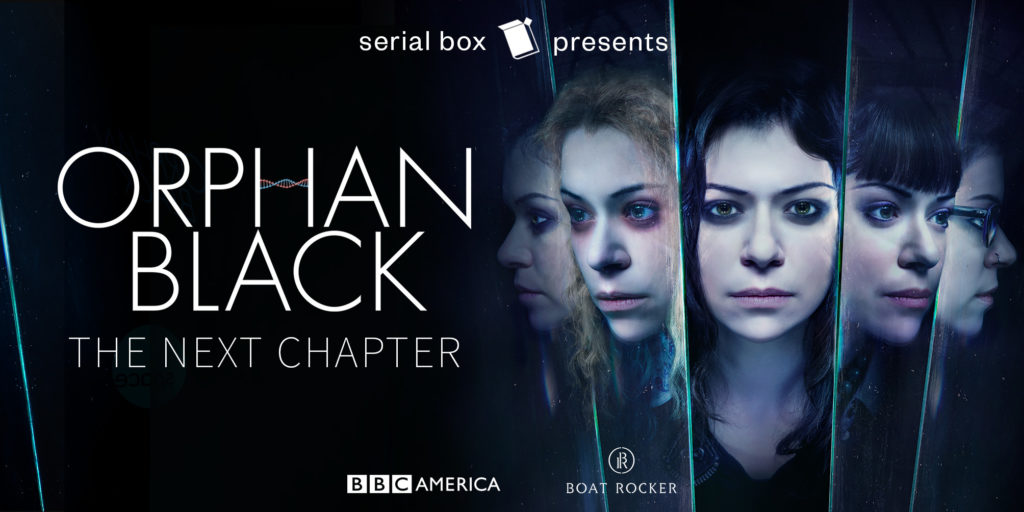
I’m interested in the process. This podcast is all about the creative process, and this is a very different process with a writer’s room throwing ideas around and coming up with ideas jointly. So, you know, usually at this point I ask where, you know, more or less, it’s a cliché, but where do you get your ideas? It sounds like there were a bunch of you working on ideas all at the same time.
Yeah, we had a great room of writers, I think. I felt really privileged to work with them. Malka Older was our showrunner, essentially. It was her pitch that ended up becoming Orphan Black: The Next Chapter. And she has a background in…well, she has a doctorate in ethics, particularly within the realm of science and socially, so that was really great, to work with her, because she brought that entire aspect of Orphan Black. And that’s a big part of the TV series, as you know, the ethics around genetics and science and using human beings in experiments. So, she brought that to the table. I’ve always felt like I learned a lot from her, getting her insight on what she thought we could do with that angle of the story. We had Madeline Ashby, who is a novelist and a futurist, and she’s flown around the world to consult on science and the future of technology. And she always had, you know, frightening, frightening stories to bring to the table about where technology could go or kind of…her viewpoint was extremely interesting, so tons to learn there. We had to E.C. Myers, and Eugene is an incredibly funny person with an extremely grounded sense of humor, and he brought a lot of insight to certain characters. He writes in YA, and we had a kind of a teen component to our story with Kira and Charlotte. And then we had also Michelle Baker, who, as a writer, she was…she comes from kind of urban fantasy and she creates very emotionally grounded, complex, deep characters. And that is also another huge touchstone for the Orphan Black universe, are these layered characters, particularly the women that Tat played, you know? So that was huge. And then Lindsey Smith, our final writer, that was in our group, she comes, she’s a novelist as well, and she has a background in…I don’t know exactly what her job is, but I want to say she’s definitely our tech expert. I think she’s a hacker? She…you know, and we have a lot of technology that we touch on in terms of, you know, computer science, so she was kind of filling that angle for us. And we deal with a lot of kind of clandestine jobs and jobs working for intelligence agencies, so she…she knew something about that as well. So, there was no shortage of ideas. I think at one point I would say, you know, we had too many ideas.
I was going to say, it sounds like it could be difficult to pare them down to one storyline.
Yeah, exactly. We had so many options for certain storylines. And then eventually, you know, you just hacked through and weeded out. And what’s kind of…it’s a blessing and a curse, but when you’re writing not for the screen, but for prose and for books or whatnot, you have less limitations in terms of, you know, sure, we had a page count, like a word count we had to adhere to, but we didn’t have a budget or, you know, how many actors we have or how many people we get to have in a scene or how many clones we could have in a scene. So, we could kind of do anything we wanted. If we wanted to take the show to Paris, we could have. We could have done any number of things. So, it gets tricky sometimes to pare it down.
So, when you took your segment away to work on, what exactly did you have in front of you in the way of notes and what were you working from?
We had done kind of…we did…we broke out a kind of rough season outline that had the arc, when we were all in New York together, and we ended up having, basically, rough tentpoles per episode of what we knew we wanted to happen for this season. So, we didn’t have details and we didn’t have maybe all of our kind of logic and minute character motivations broken out or completely hammered out, rather, but we did know in a general way what all the big moments were and how we were gonna work them in. And we had kind of spitballed and riffed on ideas in the room. So, we came away with the flavor of certain scenes that we knew we wanted to have in the series and kind of moments that we really thought were valuable for the tone of the show or for, you know, entertainment value or for plot and thematic and dramatic statements and themes. So, when I sat down, I had kind of, I would say like five, six, seven big moments that I knew had to happen in my episode and I went to work and tried to string them together and create scenes to build off of that into an outline, and then we sent the outlines around and all read and had discussions and Skype calls where we all were on split screens talking to each other. And then I just kept refining the outline, and we went through an approval process with the, with Temple Street/Boat Rocker Media, that’s the company that initially produced Orphan Black here in Toronto, and a producer that had worked on the show, Kerry Appleyard, would give us notes and we’d go back and redraw our outlines and then move to draft.
It’s a very different process from someone simply writing their own novel.
Yes, it’s very collaborative. Sometimes a little chaotic, confusing.
I suppose it’s much more like writing…anytime you’re writing on a TV series or something where you have an arc for the season, but you have a bunch of different writers working on different episodes, it must be pretty much the same process.
Yeah, I would say it’s most similar to a TV writing room. That’s kind of what we had going on, except for we were all over the continent and sometimes in other time zones when certain people are to fly off to other countries for gigs. So, it was a little challenging. We weren’t all locked together in a room anywhere. We didn’t reconvene after that story summit that we had. But yeah, essentially, yeah, it’s a very collaborative process. I mean, coming from film making, I love working with other writers and filmmakers and I really enjoy working in a group that way. I think for certain projects…I’m writing a book right now of my own, a novel…there’s certain projects that I think for me I do well being alone writing. But in this case, Orphan Black is a very complex universe. The themes are very complex. The topics are sometimes hard to grasp. It’s…you have to generate a lot of content because they’ve already had five seasons of material that they’ve run through and multiple characters that Tatiana has played. So, working in a group like this for this kind of show or story series, really…I don’t know. It’s hard to do it alone.
Was there an overall editor that…or an individual who edited each book as it came along?
Yeah. We had two editors, Lydia Shamah and Marco Palmieri, who were with us for the duration of development and through to the end to copyedit, and they both kind of…they split the work up. Lydia was with us for the first half of the project and then Marco came in for the latter half. And they were amazing editors. They were always reading all the content that we were trying to create. They are helping us figure out if we had dropped threads or what we needed to kind of pick up and..’cause a series like Orphan Black: The Next Chapter, you know, it’s a thriller. There’s a lot of characters, there’s a lot going on. So it’s easy when you’re just focused on your individual episode to lose sight of the bigger picture or to miss a beat that’s integral to the plot. So, really it was invaluable to have other eyes looking at our project from a kind of broader scope.
Whenever you’re writing anything, what you’re…just the physical process? Do you sit in a home office? Do you go out to a coffee shop? How do you like to write?
I used to write in coffee shops a lot because I have a very moody husky and he likes to bug me all the time when I’m writing. And I just couldn’t get anything done because she didn’t like it when I was on my laptop. So I used to go out and I used to write with an author, a friend of mine, Christian Cameron. He’s known also as Miles Cameron. He writes a lot of historical fiction and fantasy. And I used to go write with him. We’d write in a kind of a bakery that had a second-floor area where there was no Wi-Fi and forced us to focus. And it was nice, because he’s written, I think…oh, God, he must have about forty books now that are out and he’s written multiple fantasy series. And he’s got a very…he’s got military training. He was in the military. So he treats…he’s very regimented, very disciplined, and he just hammers through pages. So, it was really good for me to write with him. It was inspiring. And, you know, it helped me to wrangle me when I was writing on contract alone. I would say for this book series, now, I’d write during the day at Ubisoft, in the office, it’s a very collaborative medium, too, a lot like film making that way, but maybe even more chaotic in some ways. And then I’d come home at night and I would either write at home or I’d force myself to go back out to a cafe, if writing…if I didn’t have a lot of gas in the tank and I knew I had to get something done.
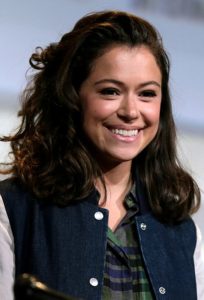
Now, one of the interesting things about Orphan Black: The Next Chapter is that Tat has narrated the audiobooks of them. Have you heard yours, your segment, with her narration?
Yes, I have. I did listen to mine and it was kind of crazy to hear Tat read my book. It was just so strange because I’d met her, you know, about a decade, over a decade ago now, I think, or maybe just about a decade ago. And yeah, it was great. I was really impressed by her work yet again. She always impresses me and she has done a great job of embodying new characters and bringing back old clone characters and also playing her other, like, her co-stars on the show. So, she plays other people from the show that she had previously worked with.
I guess she’d have to, wouldn’t she?
She plays, you know, she plays, Felix, played by…her brother on the show, played by Jordan Gavaris. She plays Donnie and Alison, who were a married suburban couple. It’s kind of wild, but yeah, it was really great to hear it. And she did a fantastic job. It played…it’s read a little bit more like a radio play than just straight-ahead audiobooks. There’s a bit of…they have some sound effects, and I thought that, production-wise, they did a great job.
Now, what do you find is the biggest difference between writing screenplays and game material now and writing straight prose? What strikes you as the difference between the two or the three?
The three. Yeah. So, screenplays are very, very structure oriented. You have, usually…you don’t want to put too much fat in there. You need to keep moving the plot and the arc of every character with each scene. You don’t have a lot of time to be…you don’t have time to meander, but you also don’t really have much ability to get very introspective with your character. You can’t jump into their head, and you don’t want to do, you know, tons of voice-over where you get into their psychology. So that’s a huge difference with prose, where you can sometimes indulge in something or explore something in the character that you might only kind of get across on screen, but you can get into their psychology more and kind of the minutiae of who they are and why they do what they do from their perspective or from another perspective. You can switch perspectives to in storytelling when you’re writing in prose. And I would say with videogame writing, there are even more restrictions on that than on film making and comic books, because you have less time for your scenes, for these cinematic scenes, cut scenes that you have in games. So, you’re writing even more economically in a dramatic scene and you’re also constantly considering so many different variables in video games of, well, where has the player potentially come from or not come from in the game? You know, what have may they have seen or completed or not completed? You write exits and entrances a little bit differently, almost like a stage play, because a lot of the cut scenes that play in games have to merge back into gameplay, so you need to write exits for certain characters. So it’s got a theatrical aspect to it that way.
I would think…in games do you not sometimes have to write a scene in more than one way, depending on how the player might come to that spot?
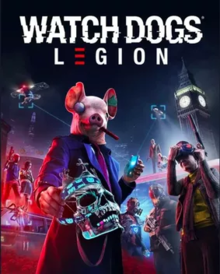
Yes. I wrote on a project called Watch Dogs: Legion at Ubisoft, and it was kind of an amazing project to write on, I have to say, because one of the main features of the game is that you can play as anyone you see in London, England. It’s set in a post-Brexit London, and you can kind of walk around and recruit people to your kind of resistance group, it’s a hacker group, and you can become that person. And as writers, the writing team for that game, we had to write from many different voices. We’d write characters in scenes, but then we would have to go back and rewrite certain scenes because you could be any number of people in the world. So, there is a lot of that which you don’t get in film making, you know, traditionally you follow one character and that’s it, or a few characters and you see certain perspectives, but in this game, you could really be anybody. So, we ended up revising a lot of things based on that.
It actually sounds like a great writing exercise, writing a scene from everybody who’s in the scene.
Yeah, exactly. Because, you know, it would shift the intentions of the characters slightly, you know. You’d have one line from a character that might always being the scene, and depending on which player character ends up in that dramatic scene, the lines and the tone of the scene shifts, you know, depending on age and gender and culture and attitude. So, it was really an amazing writing exercise.
I think I’m going to steal that for a writing workshop sometime. I think it could make an interesting writing workshop.
Oh, you should. You should have a scene where you have to rewrite one character as different people and see how far you can push, you know, an archetypal scene.
I did a book, that was never published…years ago…I rewrote it twice. Still couldn’t make it work. But I changed the main viewpoint character. So, I sort of did that once. Well now, we’re getting close to the end of our time. We’ve got about ten minutes left. So I want to ask the big philosophical question, which is, “Why do you write? Why do you think any of us write? Why do we tell stories and why do we do it through writing?”
Wow. Yeah. The big philosophical question. For me, I think with writing…there’s probably a few answers to this question. One of the most…one of the predominant reasons that I write would be to connect with people. I really…you know, to be able to build a story and explore something that either puzzles or interests me or affects me, you know, that I’ve seen in the world or that has, you know, somehow come to me as a story idea…to build something like that and then have someone else read it, right after I write it, in a year, two years, years, maybe even when I’m dead…who knows who’s gonna read what a person writes? You know, someone could read what you’ve written a hundred years from now…that is just, you know, to me, that is just the reason I write, I think, because I’ve read so many people’s work. I’ve read work that had been written, you know, hundreds of years ago, and it still resonates with people, and I’ve learned from it, I’ve…it’s changed me as a person, you know, when you read something and it has an impact on you, I think. I think that’s one of the reasons I write. Just to connect with people.
Why do you…you have, clearly, from the beginning, been drawn a bit to the fantastical and the weird and the strange. So why do you think we choose to tell those kinds of stories? Like, Orphan Black is kind of set in our world, but it’s not, It’s not really, it’s a fantastical story. And so, what draws you to those kinds of stories?
Number one, I think I’m an escapist. I like a little bit of escapism. I definitely think that some of my fascination with Tolkien dealt with wanting to escape as a kid and go to another world and I used to act out those stories as well, I’d write these elaborate storylines, but I also think the reason we gravitate towards genres that kind of bend our world into…or characters into…you know, things that don’t exist in our real world…I think we really enjoy that because we can connect with it. And I think that when we can manipulate people or characters and environments, we can highlight things even more so that we see in the world or that we feel or things that we want to, you know, challenge. We can highlight that, you know, we can use genre as a form of criticism or, you know, a way of bringing things to light. I think that we…it’s like giant metaphor. And I think that that’s one of the reasons genre for me is so attractive, you know, because I can be entertained and intrigued by something that seems new and fresh, and at the same time I can relate it back to, you know, what I see politically in in our world or I can relate it back to a personal experience and a walk of life by experiencing something that’s seemingly so different and otherworldly.
Now, you’ve mentioned the game that you’re working on. You also mentioned a novel that you’re working on. Do you want to say anything more about it?
Yeah, sure. This one…this kind of touches back to, you know, when I was a kid, and…it’s a story called The Penny Discount, currently, and it’s a fantasy novel about two thirteen-year-old girls who learn about…they learn about debt and credit debt through the use of magic. Yeah. It focuses a lot on that and on, you know, seeking out happiness. And, yeah, it has a lot to do with consumerism as well. And having a very, very close friendship with somebody and having big dreams and goals and maybe not going about them in the best way.
And how far along are you in that?
I am…I have yet to write the end of it. I am around…I’m getting up there for a kid’s book, I’m just over sixty thousand words. But I’m about to go through and do a kind of a little bit of a structural rework of it. But yeah, it’s been really fun to write in prose because, you know, when you’re writing like that, you feel like you can kind of just, you can freewheel a little bit here and there and explore stuff that you don’t always get to explore in other formats of writing.
Do you have publication lined up? Do you have any idea when this will be published?
This one I’ve just kind of kept to myself. I haven’t really told many people about it until now. It’s been secret, just in case, you know, it’s not too hot, then I don’t have to tell anybody I’ve ever done it. But it’s just one of these projects that kind of just flows when you’re writing it. And I’m really excited about it. So, yeah, I’m hoping to get back on that and finish that now that Orphan Black: The Next Chapter is out. And, yeah, that’s kind of the next thing I’m working on, going back to something that touches back to my roots and has a lot of me in it.
And if people want to keep up with what you’re doing, do you have a website or online presence, or where can they find you?
You can find me on Twitter @HeliKennedy, or Instagram, I’m on there, too. But yeah, I’m on Twitter. So reach out if you like.
Yeah, well. Hopefully people will do that. So thanks so much for being on The Worldshapers. It’s been a fun conversation.
Yeah. Thank you so much for having me.
And good luck with the novel.
Thanks so much.
Bye for now.

